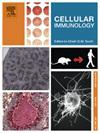eb病毒核抗原1 (EBNA1)特异性t细胞受体的鉴定:对ebv相关恶性肿瘤免疫治疗的意义
IF 2.9
4区 医学
Q2 CELL BIOLOGY
引用次数: 0
摘要
depstein - barr病毒核抗原(EBNA1)在所有三种EBV潜伏期类型中都有独特的表达,使其成为tcr工程t细胞治疗EBV相关恶性肿瘤的理想靶点。然而,ebna1特异性TCR-T细胞的制备,特别是EBV潜伏期I型,仍处于探索性阶段。方法采用以EBV菌株B95-8 EBNA1的完整序列(甘氨酸-丙氨酸重复区除外)合成的肽脉冲的自体树突状细胞刺激sebna1特异性T细胞。对于预刺激和后刺激的T细胞,使用高通量单细胞TCR V(D) J测序鉴定出频率显著增加的候选ebna1特异性TCR。EBNA1特异性tcr工程T细胞在体外对淋巴母细胞样细胞系(LCLs)和EBNA1肽脉冲dc的功能进行了评估。结果成功扩增bna1特异性T细胞。分离候选ebna1特异性TCR,构建相应的TCR基因序列并导入外周血T细胞。表达EBNA1特异性TCR的工程T细胞在体外表现出对自体lcl和dc特异性识别EBNA1的能力。结论本研究建立了扩增ebna1特异性功能TCR-T细胞的可行性,为针对所有ebv相关恶性肿瘤(包括潜伏期I)的过继细胞治疗提供了基础。本文章由计算机程序翻译,如有差异,请以英文原文为准。
Identification of Epstein-Barr virus nuclear antigen 1 (EBNA1)-specific T-cell receptors: implications for immunotherapy targeting EBV-associated malignancies
Background
Epstein-Barr virus nuclear antigen (EBNA1) is uniquely expressed across all three EBV latency types, making it an ideal target for TCR-engineered T-cell therapy against EBV-associated malignancies. However, preparation of EBNA1-specific TCR-T cells, particularly for EBV latency I type, remains exploratory.
Methods
EBNA1-specific T cells were stimulated using autologous dendritic cells (DCs) pulsed with peptides synthesized from the complete sequence (except the glycine-alanine repeat region) of the EBNA1 of EBV strain B95–8. For pre-stimulated and post-stimulated T cells, candidate EBNA1-specific TCRs with significantly increased frequencies were identified using high-throughput single-cell TCR V(D) J sequencing. The functionality of EBNA1-specific TCR-engineered T cells was assessed in vitro against lymphoblastoid cell lines (LCLs) and EBNA1 peptide-pulsed DCs.
Results
EBNA1-specific T cells were successfully expanded. Candidate EBNA1-specific TCRs were isolated, corresponding TCR gene sequences were constructed and introduced into peripheral blood T cells. Engineered T cells expressing EBNA1-specific TCR demonstrated specific recognition of EBNA1 presented by autologous LCLs and DCs in vitro.
Conclusions
This study establishes the feasibility of expanding functional EBNA1-specific TCR-T cells, providing a foundation for adoptive cell therapy targeting all EBV-associated malignancies, including latency I.
求助全文
通过发布文献求助,成功后即可免费获取论文全文。
去求助
来源期刊

Cellular immunology
生物-免疫学
CiteScore
8.20
自引率
2.30%
发文量
102
审稿时长
30 days
期刊介绍:
Cellular Immunology publishes original investigations concerned with the immunological activities of cells in experimental or clinical situations. The scope of the journal encompasses the broad area of in vitro and in vivo studies of cellular immune responses. Purely clinical descriptive studies are not considered.
Research Areas include:
• Antigen receptor sites
• Autoimmunity
• Delayed-type hypersensitivity or cellular immunity
• Immunologic deficiency states and their reconstitution
• Immunologic surveillance and tumor immunity
• Immunomodulation
• Immunotherapy
• Lymphokines and cytokines
• Nonantibody immunity
• Parasite immunology
• Resistance to intracellular microbial and viral infection
• Thymus and lymphocyte immunobiology
• Transplantation immunology
• Tumor immunity.
 求助内容:
求助内容: 应助结果提醒方式:
应助结果提醒方式:


